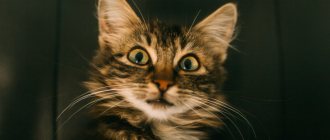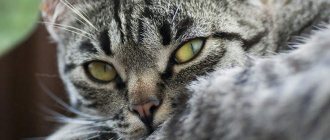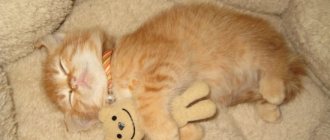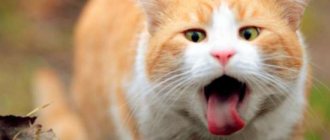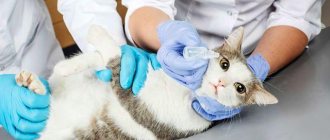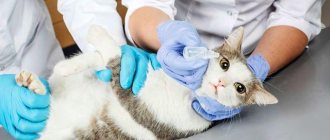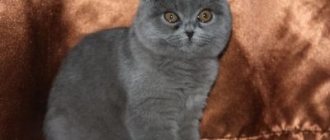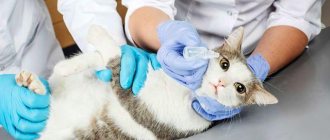There are many causes of nausea in cats: the accumulation of a large amount of hair in the stomach, poisoning with drugs and household chemicals, a foreign body in the gastrointestinal tract. However, if your pet is vomiting undigested food, the problem is most likely with the type and quality of the food.
We will find out the main causes of nausea and vomiting in cats, we will look at how to help your pet and how to prevent the reoccurrence of this condition.
Main reasons
Vomiting in a cat usually does not occur immediately. Regurgitation occurs in several stages:
- first there is a cough, which gradually intensifies;
- the cat feels anxious, performs unusual actions, for example, backing away;
- the pet begins to breathe frequently and constantly performs swallowing movements;
- at the very last moment he cranes his neck and bends down.
There can be several causes of vomiting in cats. Before starting treatment, you need to know the true reasons for poor health. It is very important to monitor your pet's condition and remember the events that preceded the onset of nausea. All this information must be told to the veterinarian during the examination.
Reflex vomiting
Occurs when the mucous membranes of the throat and palate become irritated by a foreign object that the cat may have swallowed.
Changing your diet
If your cat is vomiting after eating undigested food, it may be due to a change in diet. Most often this happens when changing the brand or type of dry food, during the transition from baby food to adult food, and then for older cats.
Changing your meal schedule
The structure of the cat's gastrointestinal tract requires the intake of food in small portions. If she is hungry, a large amount of gastric juice can leave the stomach, reach the oral cavity and provoke belching.
Interesting! Some breeds are considered prone to gluttony. Therefore, they require a clear nutrition schedule.
With frequent feeding or free access to food, some animals do not feel full and overeat. The food does not have time to be digested, the stomach becomes full, and the cat vomits after eating undigested food.
Spitting up fur
In the process of licking, cats, especially long-haired ones, swallow a considerable amount of hair. This is how a hairball forms in the stomach, which is then regurgitated. This is a normal physiological process.
Poisoning
Food poisoning in cats is diagnosed extremely rarely, as they are very picky. If the smell of food is not attractive, the pet will not eat. Therefore, kittens are more likely to suffer from poisoning.
It can be triggered not only by poor-quality food, but also by other substances:
- household chemicals;
- medicines;
- poison for mice and rats;
- fertilizers for plants or preparations for controlling garden pests;
- house plants.
Pregnancy status
A pregnant cat may vomit, but this is not due to toxicosis. In the later stages, the cat's gastrointestinal tract is compressed, and food flows back into the esophagus.
Infections
Domestic cats can become infected with infectious diseases:
- feline distemper or panleukopenia;
- enteritis (caused by coronavirus infection);
- calcivirus
Infection with worms
During their life, parasites secrete toxic substances that provoke vomiting after eating or in between meals.
Brain damage
When the brain is damaged in mammals, nausea occurs - this is where the vomiting center is located:
- tumors of the brain and membranes;
- concussion and bruise;
- increase in intracranial pressure.
Preventive measures
Preventive measures that can protect an animal from vomiting include vaccination, as well as periodic visits to the doctor for a routine examination.
To prevent your pet from being poisoned by parasites, it must be treated with special means.
During the molting period, the cat needs to be combed thoroughly. Once every six months you can buy it with a special shampoo. You can also give your pet special food that can remove fur from the stomach.
You should not allow your pet to overeat. You need to watch what he eats and drinks. It is also necessary to inspect the animal's toys for the presence of small, easily breakable parts that the pet can swallow.
The most important thing is to notice in time that the animal feels unwell. If you consult a doctor in a timely manner, vomiting can be quickly stopped and complex and painful treatment can be avoided.
How to help your pet
Veterinarians do not recommend treating a cat on your own in such a situation, but while waiting for an appointment with a doctor, it is important to understand what to do to make your pet feel better:
- provide the cat with constant access to clean and fresh water;
- give rice water, you can add boiled cereal to the food;
- include meat puree for baby food in the diet;
- feed the animal skinless chicken breast;
- Give your cat low-fat or low-fat cottage cheese.
It is recommended to follow this gentle regimen for at least 1 day. If vomiting does not recur, you can return to your normal diet. If your cat continues to burp, you will still need to visit a doctor.
Symptoms that require immediate veterinary attention
If other symptoms are combined with a cat’s vomiting of undigested food, the animal will need emergency veterinary care:
- nausea occurs after every meal;
- a small kitten that has not been vaccinated is vomiting;
- the cat constantly vomits, even if he does not eat;
- the animal’s body temperature has increased or, conversely, decreased;
- vomit has a foul odor or looks like feces;
- there are worms in the vomit or an admixture of blood or mucus;
- the condition is accompanied by seizures.
Diagnostics
If your cat vomits after eating, and this happens at least 3 times during the day, the veterinarian will order an examination. Before this, the owner must tell everything that has happened to the animal recently. It is worth paying attention to the following things:
- It is necessary to analyze what the pet ate and drank before it vomited for the first time. It is also worth remembering the medications and vaccines that have been introduced recently.
- It is important to understand whether the cat has access to household chemicals, cosmetics and home flowers.
- Clearly determine whether nausea occurs immediately after eating or over a period of time.
- By the composition of the vomit (food, gastric juice, uncharacteristic impurities) you can determine which food causes the reaction. Some cats vomit after eating food, but a natural diet does not cause such a reaction.
- The color of the vomit needs to be assessed.
- Pay attention to how the cat eats, whether it has an appetite.
- Before going to the doctor, it is important to note the nature of your animal's stool.
- The psychological situation should also be analyzed. Cats can react to moving, the appearance of a new person or animal.
Important! Both psychological and somatic changes in an animal’s life can equally provoke changes in its well-being.
In what cases is it necessary to see a doctor?
Bile-colored vomit or watery vomit mixed with blood can be a harbinger of serious health problems. This is a fairly serious reason to contact a veterinarian.
You can find out exactly the cause of your pet's condition from your veterinarian.
What is intestinal obstruction
Often, while playing, animals swallow small toys, paper clips, erasers, etc. By clogging the intestinal lumen, swallowed objects prevent food from passing through the intestines. A sick pet experiences frequent vomiting and loses weight. Most owners start treating their pet for food poisoning instead of taking it for an x-ray.
Important! If you miss precious time, the foreign body can only be removed through surgery.
If vomiting begins suddenly, if it is severe and prolonged, such a situation can be called an emergency. The detection of blood or foreign objects in the vomit indicates the need to provide emergency assistance to the animal.
If the vomit looks like coffee grounds, this is also an emergency. Vomiting accompanied by changes in appetite, appearance, behavior, or habits may also indicate serious health problems.
Here's what not to do:
- ignore the animal's condition;
- dramatically change your diet;
- leave poisonous plants in areas that the cat has access to. The same rule applies to cleaning products and household chemicals;
- You should not leave small objects that are tempting for a cat (earrings, rings, hair ties, etc.) within the animal’s reach;
- You should not give your cat antiemetic medication without consulting your veterinarian.
Treatment
Only a doctor can prescribe medications after examining the animal and talking with the owner. The process may include several stages:
- At first, from 6 to 8 hours, you cannot feed the animal.
- At the end of the break in food intake, a gentle diet is prescribed, depending on the diagnosis.
- The cat needs to be fed in small portions, and this regimen may have to be used constantly.
- The main diet should consist of boiled poultry, lean fish, rice and its broth.
- If your health improves, the menu can be gradually expanded.
- In case of poisoning, antiemetic and detoxification drugs are prescribed. They must be taken every day for the specified time and in accordance with the instructions for use.
It is important to monitor the progress of treatment with your doctor. If the condition worsens, a repeat consultation will be required.
How to avoid vomiting
If the reason your cat is vomiting is due to dietary errors, then to prevent repeated episodes you need to follow simple rules:
- if it is necessary to change cat food, this should be done gradually: daily replace some of the old with new;
- divide the daily dose of food into smaller portions, make meals more frequent;
- switch your pet to natural food if the food causes vomiting;
- If you have problems with fur, use special food for long-haired cats.
Vomiting in a cat is an indicator of problems in the organization of life. To eliminate this situation, you will need to analyze all aspects of keeping your pet and find the cause of the nausea.
If this has already happened once, it is important to constantly pay maximum attention to the quality of food and adherence to the nutritional schedule.

